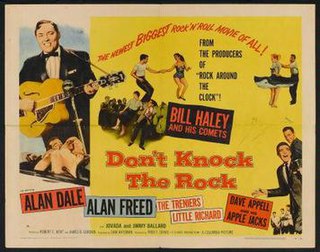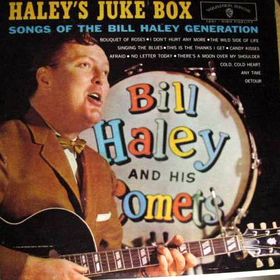Related Research Articles

William John Clifton Haley was an American rock and roll musician. He is credited by many with first popularizing this form of music in the early 1950s with his group Bill Haley & His Comets and million-selling hits such as "Rock Around the Clock", "See You Later, Alligator", "Shake, Rattle and Roll", "Rocket 88", "Skinny Minnie", and "Razzle Dazzle". Haley has sold over 60 million records worldwide. In 1987, he was posthumously inducted into the Rock and Roll Hall of Fame.

"Rock Around the Clock" is a rock and roll song in the 12-bar blues format written by Max C. Freedman and James E. Myers in 1952. The best-known and most successful rendition was recorded by Bill Haley & His Comets in 1954 for American Decca. It was a number one single for two months and did well on the United Kingdom charts; the recording also reentered the UK Singles Chart in the 1960s and 1970s.

Bill Haley & His Comets was an American rock and roll band formed in 1947 and continuing until Haley's death in 1981. The band was also known as Bill Haley and the Comets and Bill Haley's Comets. From late 1954 to late 1956, the group recorded nine Top 20 singles, one of which was number one and three that were Top Ten. The single "Rock Around the Clock" was the best-selling rock single in the history of the genre and maintained that position for several years.

Yodeling is a form of singing which involves repeated and rapid changes of pitch between the low-pitch chest register and the high-pitch head register or falsetto. The English word yodel is derived from the German word jodeln, meaning "to utter the syllable jo". This vocal technique is used in many cultures worldwide. Recent scientific research concerning yodeling and non-Western cultures has shown that music and speech evolved from a common prosodic precursor.
The Four Aces are an American male traditional pop quartet popular since the 1950s. Over the last half-century, the group amassed many gold records. Its million-selling songs include "Love is a Many-Splendored Thing", "Three Coins in the Fountain", "Stranger in Paradise", "Tell Me Why", and "(It's No) Sin". Other big sellers included "Shangri-La", "Perfidia", and "Sincerely", and “Written On The Wind”. “Love Is A Many Splendored Thing” won the Academy Award for Best Song in 1955. The original members, responsible for every song made popular by the group, included Al Alberts, Dave Mahoney, Lou Silvestri, and Rosario "Sod" Vaccaro.

Don't Knock the Rock is a 1956 American musical film starring Alan Dale and Alan Freed. Directed by Fred F. Sears, the film also features performances by Bill Haley & His Comets, Little Richard, The Treniers, and Dave Appell and the Applejacks.
Charles Lewis Haley is an American former professional football player who played in the National Football League (NFL) for the San Francisco 49ers and Dallas Cowboys (1992–1996).
James Edward Myers was an American songwriter, music publisher, actor, director, producer, and raconteur.
Orfeón is a record label from Mexico, which has released many recordings for the Latin American market since at least the 1950s.

Marshall Edward Lytle was an American rock and roll bassist, best known for his work with the groups Bill Haley & His Comets and The Jodimars in the 1950s. He played upright slap bass on the iconic 1950s rock and roll records "Crazy Man, Crazy", "Shake, Rattle and Roll", and "Rock Around the Clock".
Holiday Records was an American record label based out of Philadelphia, Pennsylvania which was active in the early 1950s. Owned by Dave Miller, who also owned Essex Records, it is best known for releasing some of the earliest recordings widely identified as rock and roll, most notably "Rocket 88" by Bill Haley and His Saddlemen in 1951.

Thomas George Russell is an American singer-songwriter. Although most strongly identified with the Americana music tradition, his music also incorporates elements of folk, rock, and the cowboy music of the American West. Many of his songs have been recorded by other artists, including Johnny Cash, The Texas Tornados, k.d. lang, Guy Clark, Joe Ely, The Sir Douglas Quintet, Jason Boland, Nanci Griffith, Katy Moffatt, Ramblin' Jack Elliott, Sailcat, Iris Dement, Dave Alvin, and Suzy Bogguss.

"Rock the Joint", also known as "We're Gonna Rock This Joint Tonight", is a 1949 boogie song recorded by various proto-rock and roll singers, notably Jimmy Preston and early rock and roll singers, most notably Bill Haley in 1952. Preston's version has been cited as a contender for being "the first rock and roll record", and Haley's is widely considered the first rockabilly record.

Essex Records was founded in Philadelphia, Pennsylvania, in 1951 by David Miller primarily to record contemporary country and western, rhythm and blues as well as jazz and gospel. Jack Howard was the promotion manager. The label had little popular success, but is known for releasing early Bill Haley & His Comets recordings such as "Rock the Joint" (1952) and "Crazy Man Crazy", the latter of which was the first rock and roll recording to make the American record charts when it was released in 1953. The label also scored success in 1954 with Eddie Calvert's recording of "O mein Papa".

Rock with Bill Haley and the Comets is the title of an early rock and roll music compilation album issued by Essex Records in December 1955, and featuring music by the titular group, Bill Haley & His Comets. The album features recordings made by Haley in 1952 and 1953, including his hits, "Rock the Joint", "Crazy Man Crazy", "Fractured", and "Live It Up".

Haley's Juke Box: Songs of the Bill Haley Generation, was the eleventh studio album by Bill Haley & His Comets. Released by Warner Bros. Records in the summer of 1960, the album was produced by George Avakian.

Sonet Records was a jazz, pop and rock record label operating as an imprint of Universal Music Sweden. It was founded in Sweden in 1956.
Bill Haley & His Comets recorded many singles and albums. The following list references only their original release and generally does not include compilation albums or single reissues. This list does not include releases on which the Comets worked as session musicians, and primarily focuses on releases during Haley's lifetime.

"Two Hound Dogs" is a 1955 rock and roll song composed by Bill Haley and Frank Pingatore. The song was released as a Decca single by Bill Haley and His Comets. The Decca single peaked at #31 on the Cash Box singles chart.
"Deal Me a Hand" is the first single recorded and released by Bill Haley and the Saddle Men, who would later achieve fame under the name Bill Haley & His Comets. The song was composed by Artie Clark and featured "Ten Gallon Stetson" as the B-side. The single did not chart, but it paved the way for more successful endeavors by the group on the Essex label. The song was never reissued until it appeared on the Bear Family Records compilation The Real Birth Of Rock 'n' Roll in 2006.